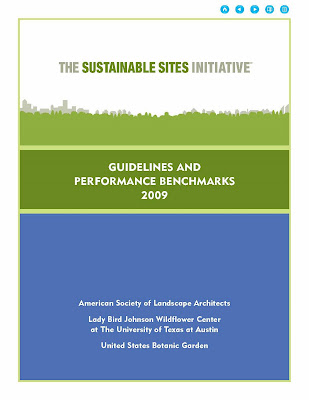From some sneak peeks of the latest update to the Sustainable Sites Initiative (more from L+U here), I was both excited about the next iteration and establishment of more rigorous set of criteria, and a bit curious how it was going to maintain some of the necessary distance, inclusivity and poetry that is lacking in many other site rating systems. I’m not sure how I feel about the new split between the guidelines and the ‘case’ for sustainable sites
The full text from the Sustainable Sites website:
“The Sustainable Sites Initiative: Guidelines and Performance Benchmarks 2009 is the product of more than four years of work by a diverse group of experts in soils, hydrology, vegetation, materials and human health and well-being. It is expanded and updated from the Guidelines and Performance Benchmarks –Draft 2008, which was released in November 2008. The Initiative developed criteria for sustainable land practices that will enable built landscapes to support natural ecological functions by protecting existing ecosystems and regenerating ecological capacity where it has been lost. This report focuses on measuring and rewarding a project that protects, restores and regenerates ecosystem services – benefits provided by natural ecosystems such as cleaning air and water, climate regulation and human health benefits.
The Guidelines and Performance Benchmarks 2009 includes a rating system for the credits which the pilot process will test for refinement before a formal release to the market place. The Rating System contains 15 prerequisites and 51 credits that cover all stages of the site development process from site selection to landscape maintenance. If you are interested in becoming a pilot project to test this Rating System, please apply here. Feedback from the pilot projects will be used to create a reference guide which will provide suggestions on how projects achieved the sustainability goals of specific credits.
The companion document titled The Case for Sustainable Landscapes provides a set of arguments—economic, environmental, and social—for the adoption of sustainable land practices, additional background on the science behind the performance criteria in the guidelines and performance benchmarks, the purpose and principles of the Sustainable Sites Initiative, and a sampling of some of the case studies the Initiative has followed.”
It’s great to see a site-specific system taking shape, and can’t wait to see it begin to permeate the discussion of true sustainability and green building – and addition long-lacking in the current dialogue. For a bit of additional info, check out this short presentation ‘Landscapes Give Back’ which makes a case for the role of landscape in this discussion. More to come.
More to come after I have a chance to take a look at the updated documents. Additionally, the concept of What is a Sustainable Site will be a common theme in the next year, as the Oregon ASLA embarks on a number of events, discussions, workshops, and symposia around this idea.

